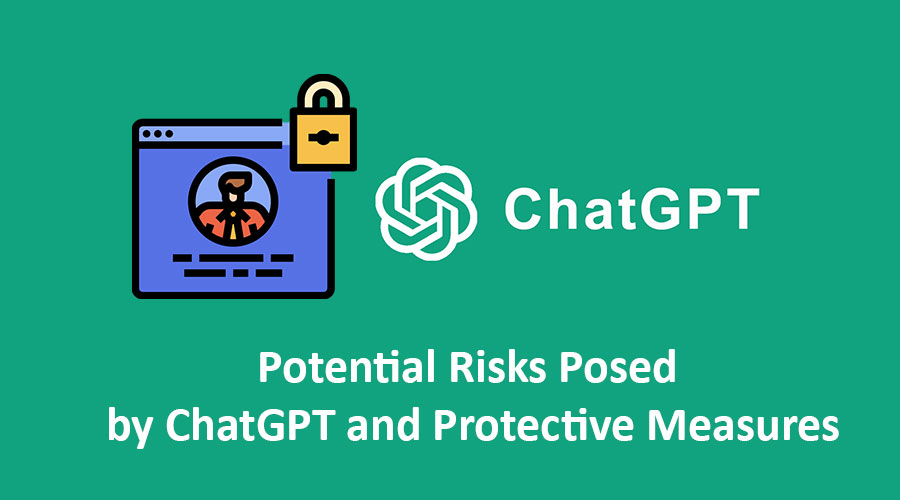
The rise of artificial intelligence has brought numerous benefits, including advanced language models like ChatGPT. These AI models are designed to generate human-like responses and provide useful information. However, it is important to be aware that the use of ChatGPT, like any other technology, comes with certain privacy risks. This article aims to shed light on how ChatGPT can potentially impact your privacy and suggests effective measures to protect yourself.
The Privacy Risks Associated with ChatGPT:
1. Data Retention
ChatGPT relies on vast amounts of data to generate responses. While OpenAI, the organization behind ChatGPT, takes privacy seriously, it's essential to understand that interactions with ChatGPT might be stored and used to improve the system. Although OpenAI has implemented measures to minimize personal data retention, the possibility of unintentional data exposure always exists.
2. Information Security
Given the nature of AI technology, there is always a risk of security breaches or unauthorized access to the data collected by ChatGPT. While OpenAI employs security measures to safeguard user information, it's crucial to remain vigilant and take additional precautions to protect your privacy.
3. Phishing and Scams
ChatGPT, if misused by malicious actors, can be leveraged to facilitate phishing attempts or spread false information. Scammers could potentially exploit the system to deceive users into sharing sensitive personal data or engaging in fraudulent activities. Vigilance and critical thinking are essential while interacting with AI models to avoid falling victim to such scams.
Tips and tricks on how to protecting your online privacy
- Limited Sharing of Personal Information:
When using ChatGPT or any other AI-powered service, it is prudent to refrain from sharing personal, sensitive, or confidential information unless absolutely necessary. Remember that AI models are not capable of guaranteeing complete confidentiality, so exercise caution when divulging personal details. - Use Incognito or Private Browsing Mode:
To mitigate potential risks associated with data retention, consider using incognito mode or private browsing when interacting with ChatGPT. These modes minimize data tracking and help prevent the storage of your browsing history or chat interactions. - Read Privacy Policies:
Before using any AI-based service, carefully read the privacy policy provided by the service provider. Understand how your data will be used, stored, and protected. Opt for services that prioritize user privacy and offer clear guidelines on data handling. - Keep Software Updated:
Regularly update your operating system, web browser, and security software to ensure that you have the latest security patches. These updates often include fixes for vulnerabilities that could be exploited by attackers to gain unauthorized access to your device or data. - Be Cautious of Phishing Attempts:
Remain vigilant when interacting with AI models and be wary of requests for personal information or suspicious links. Double-check the credibility of the information provided by the AI model and verify it through reliable sources. - USE a VPN.
Selecting the best VPN (Virtual Private Network) for ChatGPT largely depends on your specific requirements and preferences. However, here are a few popular VPN services that are generally considered reliable and offer robust privacy features:
-
ExpressVPN: Known for its excellent security and high-speed connections, ExpressVPN offers a user-friendly interface and a vast network of servers across numerous locations. It employs strong encryption protocols and does not keep activity logs, providing a solid level of privacy.
-
NordVPN: With a large server network and advanced security features, NordVPN is a popular choice among privacy-conscious users. It offers strong encryption, a strict no-logs policy, and additional features like Double VPN, which routes your traffic through two different servers for enhanced privacy.
-
CyberGhost: Designed with user-friendliness in mind, CyberGhost provides a straightforward interface and a wide range of servers optimized for various purposes, including privacy and security. It features robust encryption, a strict no-logs policy, and ad-blocking capabilities.
-
Conclusion
While ChatGPT and similar AI models offer incredible capabilities, it is important to understand the potential privacy risks they entail. By taking proactive steps to protect your privacy, such as limiting personal information sharing, using secure browsing modes, and staying informed about privacy policies, you can mitigate the potential risks associated with AI-powered services. Remember, the responsibility for safeguarding your privacy ultimately lies with you, the user.




